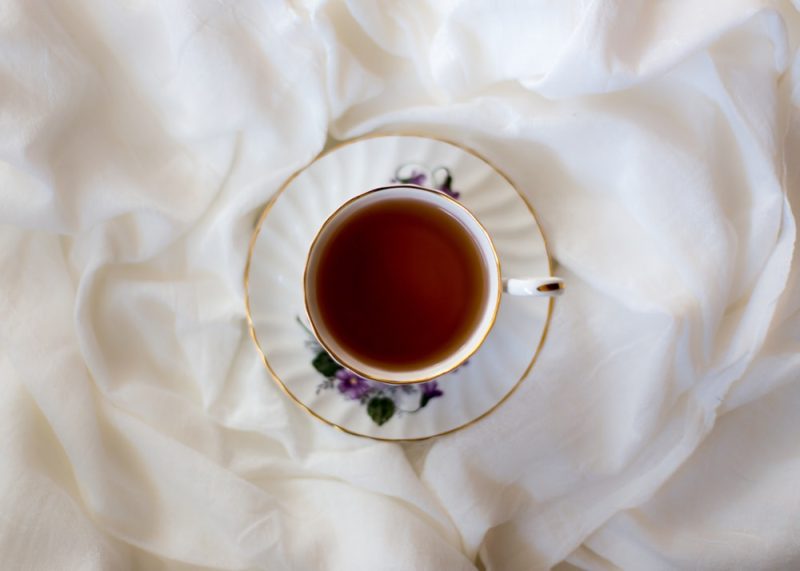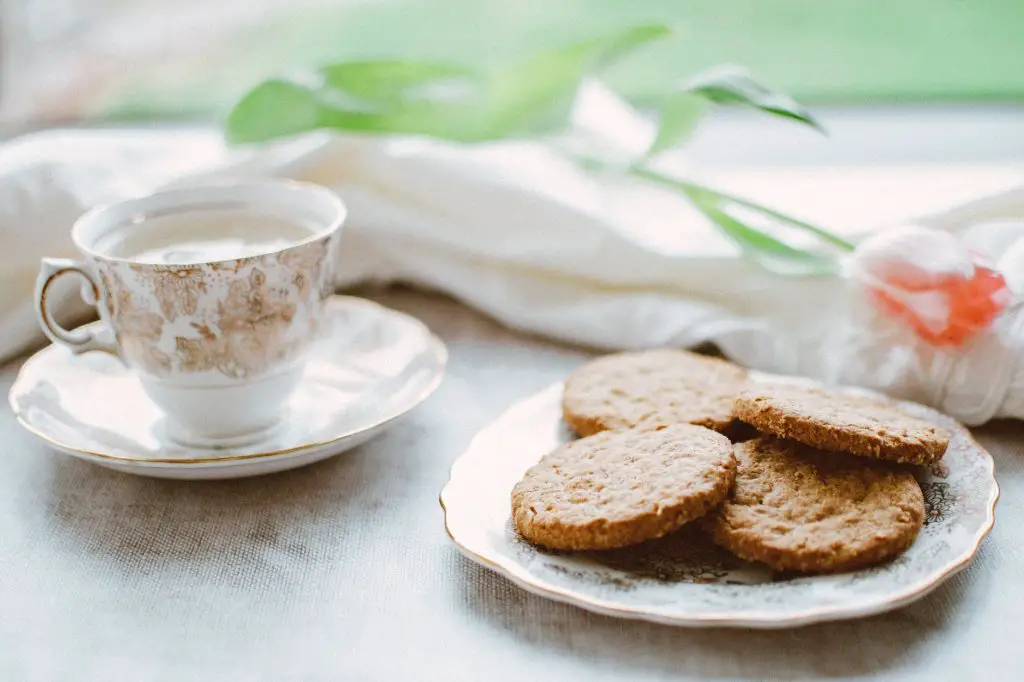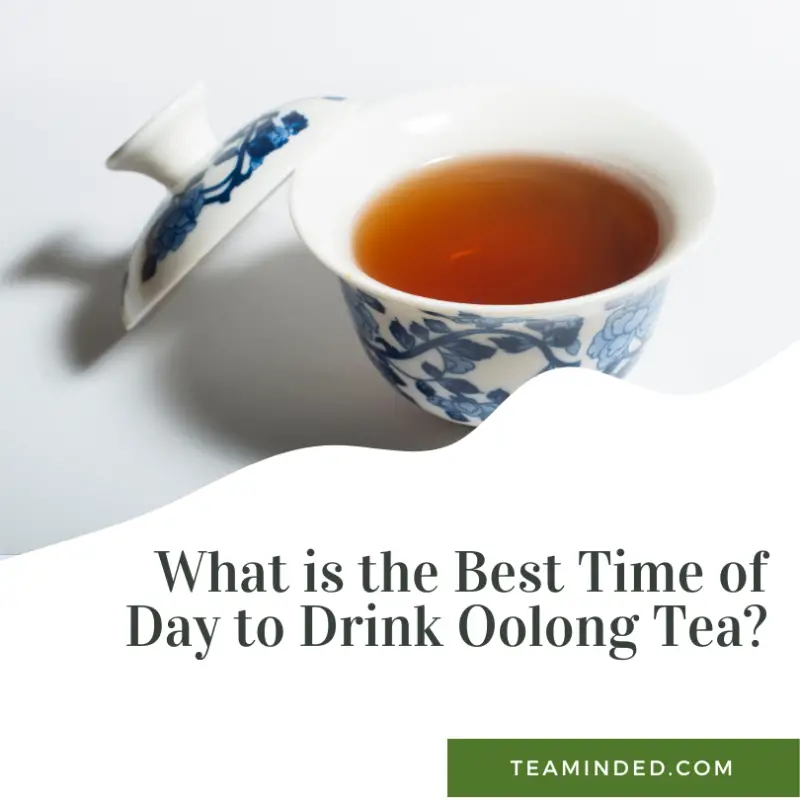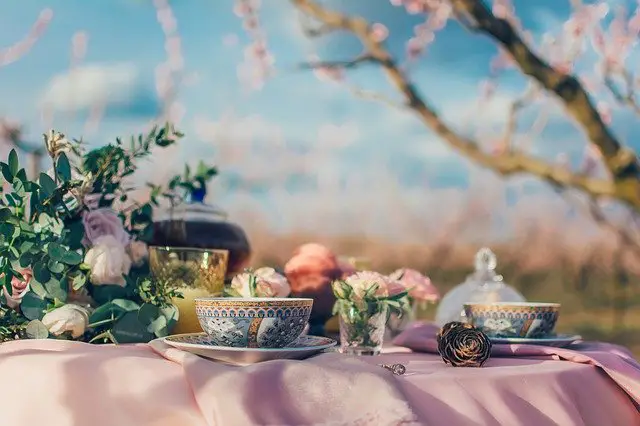Oolong tea is a traditional Chinese tea that has gained popularity worldwide due to its unique taste and numerous health benefits. It is a semi-oxidized tea that falls somewhere between green and black tea in terms of processing and flavor. However, one question that often comes to mind is – what is the best time of day to drink oolong tea?
The answer to this question depends on several factors, including your personal preferences, health goals, and lifestyle. Some people prefer to drink oolong tea in the morning to boost their energy levels and kick-start their metabolism. Others prefer to drink it in the afternoon or evening as a way to unwind and relax. In this article, we will explore the best time of day to drink oolong tea based on various factors.

We will discuss the benefits of oolong tea, the optimal time to drink it, and how to brew it correctly. We will also explore the different ways you can pair oolong tea with food and the most common consumption patterns. Finally, we will answer some frequently asked questions about oolong tea to help you make an informed decision about when and how to drink it.
Quick Navigation
Key Takeaways
- The best time of day to drink oolong tea depends on personal preferences, health goals, and lifestyle.
- Oolong tea can be consumed to boost energy levels in the morning or to unwind and relax in the afternoon or evening.
- Pairing oolong tea with food and understanding the most common consumption patterns can enhance your overall experience.
Understanding Oolong Tea
If you’re looking for a tea with a complex flavor profile that’s somewhere between green tea and black tea, oolong tea might be the perfect choice. This tea is traditionally grown in China and Taiwan, and it’s made by partially oxidizing the leaves of the Camellia sinensis plant. Oolong tea has a unique flavor that can range from floral to nutty, and it’s often enjoyed for its many health benefits.
Origins and Types
Oolong tea has been enjoyed in China for centuries, and it’s become increasingly popular in other parts of the world in recent years. There are many different types of oolong tea available, and the flavor can vary depending on factors like the region where the tea is grown, the time of year when it’s harvested, and the processing methods used.
Some of the most popular types of oolong tea include:
- Tie Guan Yin: This oolong tea is grown in the Fujian province of China, and it has a floral, slightly sweet flavor.
- Da Hong Pao: Also known as “Big Red Robe,” this oolong tea is grown in the Wuyi Mountains of China, and it has a rich, smoky flavor.
- Oriental Beauty: This oolong tea is grown in Taiwan, and it has a fruity, honey-like flavor.
Health Benefits
Oolong tea is often enjoyed for its many health benefits. Here are a few of the most notable:
- Weight loss: Oolong tea contains caffeine and catechins, which can help boost your metabolism and promote weight loss.
- Heart health: Drinking oolong tea may help lower your risk of heart disease by reducing your cholesterol levels and improving your blood pressure.
- Digestion: Oolong tea can help improve your digestion by stimulating the production of digestive enzymes and reducing inflammation in your gut.
Overall, oolong tea is a delicious and healthy beverage that can be enjoyed any time of day. Whether you prefer a light, floral tea or a rich, smoky brew, there’s an oolong tea out there that’s perfect for you.
Best Time to Drink Oolong Tea
Oolong tea is a popular beverage that is enjoyed around the world for its unique flavor and numerous health benefits. One of the most common questions about oolong tea is when is the best time to drink it. In this section, we will explore the answer to this question and provide expert insights on the best time to enjoy this delicious tea.
Morning Benefits
One of the best times to drink oolong tea is in the morning. Oolong tea contains caffeine, which can help you feel more alert and focused. This makes it a great alternative to coffee for those who want to reduce their caffeine intake. Additionally, oolong tea contains antioxidants that can help boost your immune system and protect your body against free radicals.
Afternoon Advantages
Another great time to drink oolong tea is in the afternoon. Oolong tea can help boost your energy levels and improve your mental clarity, making it a great choice for a midday pick-me-up. Additionally, drinking oolong tea in the afternoon can help curb your cravings and prevent you from reaching for unhealthy snacks.
Evening Considerations
While oolong tea can be enjoyed at any time of day, it is important to consider the caffeine content when drinking it in the evening. Too much caffeine in the evening can disrupt your sleep and leave you feeling groggy in the morning. If you want to enjoy oolong tea in the evening, it is best to choose a decaffeinated variety.
In conclusion, the best time to drink oolong tea depends on your personal preferences and lifestyle. Whether you prefer to drink it in the morning to start your day off right, in the afternoon as a pick-me-up, or in the evening as a relaxing beverage, oolong tea is a delicious and healthy choice that can provide numerous benefits for your body and mind.
Brewing Techniques
To get the most out of your oolong tea, you need to follow specific brewing techniques. Here are some essential tips to help you make the perfect cup of oolong tea.
Water Temperature
The water temperature is one of the most crucial factors when it comes to brewing oolong tea. The ideal water temperature should be around 190°F to 200°F (88°C to 93°C). Water that is too hot can burn the tea leaves and make the tea taste bitter. On the other hand, water that is too cold can prevent the tea from fully steeping, resulting in a weak and flavorless brew.
Steeping Time
The steeping time for oolong tea can vary depending on the type of tea and your personal preference. As a general rule, oolong tea should be steeped for 1 to 5 minutes. Steeping time is critical because it determines the strength and flavor of the tea. Oversteeping can make the tea taste bitter, while under steeping can result in a weak and flavorless brew.
To get the perfect cup of oolong tea, you need to experiment with different steeping times until you find the right balance of flavor and strength that suits your taste. Remember to use high-quality loose-leaf oolong tea and fresh water to enhance the flavor and aroma of your tea.
By following these simple brewing techniques, you can enjoy a perfect cup of oolong tea any time of day.
Pairing Oolong Tea With Food
Oolong tea is a versatile beverage that pairs well with a variety of foods. The flavor profile of oolong tea is complex and can range from light and floral to bold and earthy, making it a great accompaniment to many different dishes. Here are some ideas for pairing oolong tea with food:
Breakfast Pairings
Oolong tea can be a great addition to your morning routine. Pair it with a light breakfast of toast, fruit, and yogurt for a refreshing start to your day. The light, floral notes in oolong tea complement the sweetness of fresh fruit, while the slight bitterness of the tea balances the creaminess of yogurt.
For a heartier breakfast, try pairing oolong tea with eggs and bacon. The bold, earthy notes in oolong tea stand up well to the rich, savory flavors of eggs and bacon, creating a satisfying and flavorful meal.
Lunch Combinations
Oolong tea is a great choice for lunchtime, as it can help to aid digestion and boost energy levels. Pair it with a light salad or sandwich for a refreshing midday meal. The light, floral notes in oolong tea complement the crispness of fresh vegetables, while the slight bitterness of the tea balances the creaminess of dressings or spreads.
For a heartier lunch, try pairing oolong tea with a stir-fry or noodle dish. The bold, earthy notes in oolong tea stand up well to the bold flavors of Asian cuisine, creating a satisfying and flavorful meal.

Dinner Synergies
Oolong tea can be a great addition to your dinner table, as it can help to cleanse the palate and aid in digestion. Pair it with a light fish or chicken dish for a refreshing and flavorful meal. The light, floral notes in oolong tea complement the delicate flavors of fish or chicken, while the slight bitterness of the tea balances the richness of sauces or marinades.
For a heartier dinner, try pairing oolong tea with a beef or pork dish. The bold, earthy notes in oolong tea stand up well to the rich, savory flavors of beef or pork, creating a satisfying and flavorful meal.
Overall, oolong tea is a versatile beverage that pairs well with a variety of foods. Whether you’re looking for a light and refreshing pairing or a bold and satisfying meal, oolong tea is a great choice.
Oolong Tea Consumption Patterns
When it comes to consuming oolong tea, there are certain patterns and guidelines you should follow in order to maximize its benefits. In this section, we will discuss the daily intake recommendations and caffeine content limitations of oolong tea.
Daily Intake Recommendations
According to experts, the ideal daily intake of oolong tea is between 3-6 cups per day. However, it is important to note that the amount of tea you should consume depends on your individual needs and tolerance levels. It is always best to start with a smaller amount and gradually increase your intake to see how your body reacts.
Caffeine Content and Limitations
Oolong tea contains caffeine, which can have various effects on the body. While caffeine can provide a boost of energy and improve mental alertness, it can also cause negative side effects such as insomnia or anxiety. Therefore, it is important to be mindful of your caffeine intake and consume oolong tea in moderation.
The caffeine content of oolong tea can vary depending on the type and preparation method. On average, a cup of oolong tea contains around 30-50mg of caffeine, which is less than a cup of coffee. However, if you are sensitive to caffeine, it is best to consume oolong tea earlier in the day and avoid drinking it before bedtime.
In summary, it is recommended to consume 3-6 cups of oolong tea per day to maximize its benefits. However, it is important to be mindful of your caffeine intake and consume oolong tea in moderation.
Frequently Asked Questions
Can oolong tea aid in weight loss, and which variety should I choose?
Yes, oolong tea has been shown to aid in weight loss by increasing metabolism and fat oxidation. The polyphenols in oolong tea help to activate enzymes that break down triglycerides, which are stored in fat cells. This means that drinking oolong tea can help to reduce body fat and prevent obesity. When choosing an oolong tea variety for weight loss, it is best to choose a high-quality tea that is less processed and has a higher concentration of polyphenols.
Is it more beneficial to consume oolong tea in the morning or evening for optimal health benefits?
The best time of day to drink oolong tea depends on your personal preference and lifestyle. Oolong tea contains caffeine, which can provide an energy boost and improve mental alertness. If you are sensitive to caffeine, it is best to consume oolong tea in the morning or early afternoon to avoid disrupting your sleep. However, if you prefer to drink oolong tea in the evening, you can choose a decaffeinated variety.
How does drinking oolong tea before meals affect digestion and metabolism?
Drinking oolong tea before meals can aid in digestion and metabolism. Oolong tea contains catechins, which help to reduce inflammation in the digestive tract and improve gut health. The caffeine in oolong tea also helps to stimulate the digestive system and increase metabolic rate, which can lead to more effective calorie burning.
Are there any adverse effects associated with consuming oolong tea before bedtime?
Drinking oolong tea before bedtime can disrupt sleep patterns due to its caffeine content. If you are sensitive to caffeine, it is best to avoid drinking oolong tea before bedtime and choose a decaffeinated variety instead.
What are the general health benefits of including oolong tea in my diet?
Oolong tea has numerous health benefits due to its high concentration of antioxidants and polyphenols. These include reducing the risk of heart disease, improving bone health, reducing inflammation, and preventing cancer. Oolong tea can also boost mental alertness and improve cognitive function.
How many cups of oolong tea are recommended daily for maximum benefits?
The recommended daily intake of oolong tea varies depending on individual factors such as age, weight, and health status. However, it is generally recommended to drink 2-3 cups of oolong tea per day to reap its maximum health benefits. It is important to note that excessive consumption of oolong tea can lead to adverse effects such as headaches, nausea, and insomnia.

Scott is the founder of TeaMinded. He enjoys tasting and discovering teas from across the globe, with green teas and ceremonial matcha from Japan being among his favorites. He’s grateful to be immersed in the tea community, always learning and sharing along the journey.





